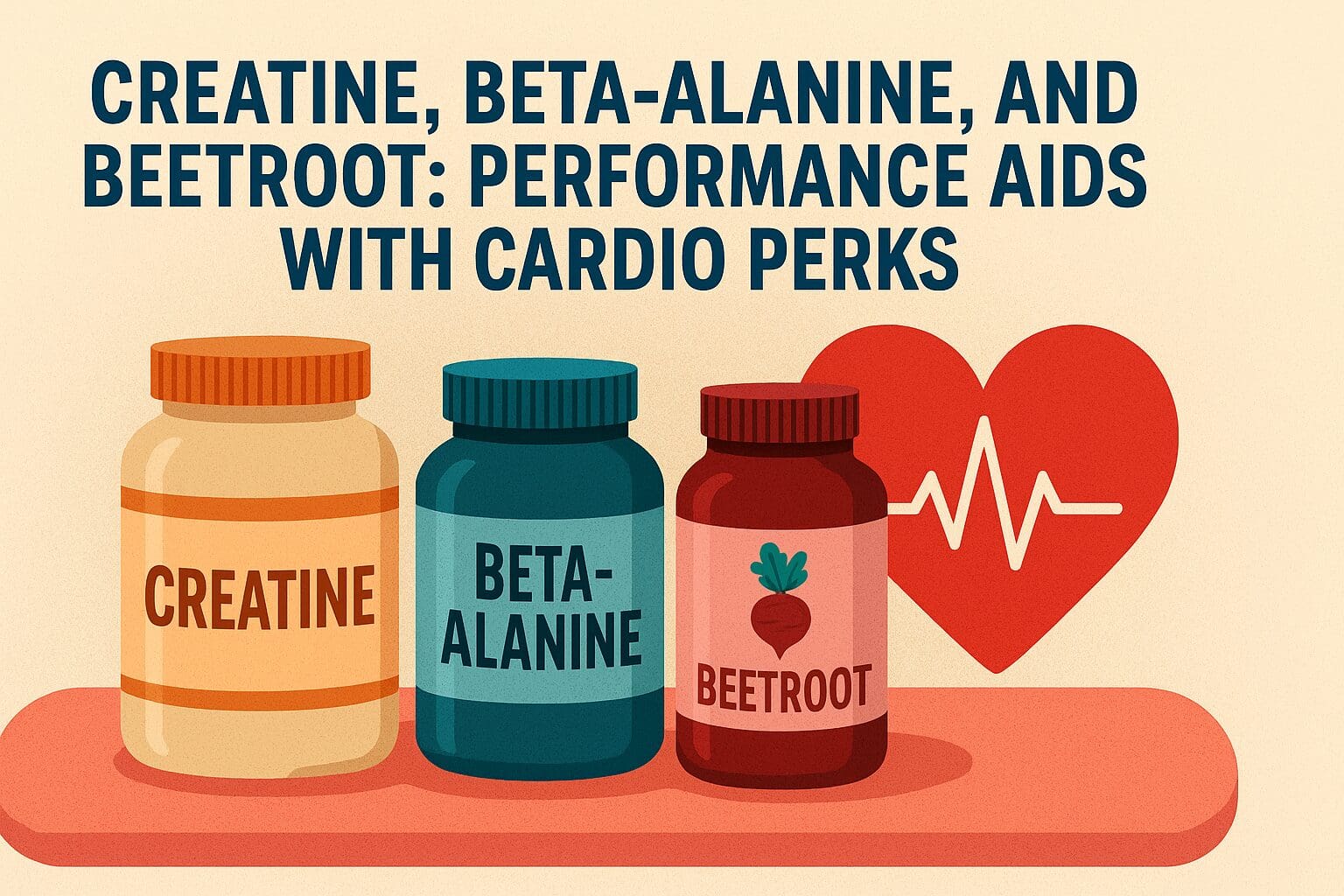Introduction
In recent years, the synergy between performance-boosting supplements and heart health has attracted both researchers and health enthusiasts alike. Ergogenic aids such as creatine, beta-alanine, and beetroot are renowned for their ability to enhance exercise performance, but emerging evidence suggests these compounds can also play a crucial role in promoting heart health and supporting an optimal heart. Integrating these supplements into your routine may not only boost athletic achievement but also serve as an ally in the pursuit of cardiovascular wellness and disease prevention. This article explores how creatine, beta-alanine, and beetroot supplements—while traditionally valued for enhancing sports performance—can indirectly protect the heart and contribute to optimal cardiovascular outcomes.
What is Review how ergogenic aids can improve training capacity and indirectly support heart health.?
Ergogenic aids are substances or techniques that enhance physical performance, stamina, or recovery. The three most studied are creatine (a compound naturally found in muscle cells and synthesized in the liver), beta-alanine (an amino acid that buffers muscle acid), and beetroot (a natural source of dietary nitrates that increase nitric oxide production). These aids were initially researched for their positive impacts on sports and exercise, but scientists now recognize their broader biological implications, especially related to cardiovascular health Grgic, 2019, Bailey, 2015. Importantly, their actions extend beyond athleticism, offering promising benefits for heart health and supporting an optimal heart.
Benefits and Outcomes in Heart Disease
Multiple lines of research suggest ergogenic aids can benefit heart health. Creatine has shown to improve mitochondrial function, reduce homocysteine levels (a cardiovascular risk factor) Brosnan, 2016, and support cardiac energy metabolism. Beta-alanine supplementation can increase carnosine levels, which buffer acid in both skeletal and cardiac muscle, potentially reducing the risk of arrhythmias or ischemic injury Artioli, 2010. Beetroot, high in dietary nitrates, is known to lower blood pressure, enhance vasodilation, and counteract arterial stiffness, all of which are pivotal for achieving an optimal heart and preventing heart disease Lidder, 2014. These cumulative effects add to the arsenal for heart health, especially when combined with physical activity.
Research Insights
Recent studies reinforce the relationship between these ergogenic aids and cardiovascular outcomes. A 2019 systematic review found creatine supplementation could help lower blood pressure and cholesterol while enhancing aerobic capacity in older adults Grgic, 2019. Beta-alanine trials suggest carnosine loading not only improves physical endurance but may protect hearts under stress Artioli, 2010. Beetroot juice, according to several clinical trials, consistently reduces systolic and diastolic blood pressure and improves endothelial function in healthy and at-risk populations Bahadoran, 2017.
Practical Applications
For those looking to leverage these ergogenic aids for both performance and heart health:
- Creatine: Common dose is 3-5g daily. Particularly beneficial for older adults, vegetarians, or those with cardiovascular concerns, provided kidney function is normal Brosnan, 2016.
- Beta-alanine: 2-5g per day divided into small doses reduces tingling side effects. Endurance athletes, older adults, and those seeking optimal heart muscle protection may benefit Artioli, 2010.
- Beetroot: 250-500ml beetroot juice or 4-8mmol nitrate equivalents before exercise, or daily over several weeks. Effective for blood pressure control and endothelial support Lidder, 2014.
Always consult a healthcare professional before starting any supplement, particularly if you have pre-existing health issues or medications.
Risks & Limitations
Overall, these supplements are well-tolerated in healthy adults. Creatine may raise serum creatinine but does not typically harm kidney function in healthy users Brosnan, 2016. Beta-alanine can cause temporary tingling. Beetroot may interact with blood pressure medications. Most studies are short-term, and long-term effects on heart disease risk are not fully established Grgic, 2019. Always seek guidance from a healthcare provider.
Key Takeaways
- Ergogenic aids like creatine, beta-alanine, and beetroot can support both performance and heart health for an optimal heart.
- Creatine improves cardiac metabolism and may lower heart disease risk factors.
- Beta-alanine may protect heart muscle under stress and enhance endurance.
- Beetroot supplementation lowers blood pressure and improves vascular function.
- These supplements are generally safe but require professional guidance for best results.
Frequently Asked Questions
1. Can creatine supplements improve heart health?
Emerging evidence suggests creatine may lower homocysteine and enhance energy metabolism in the heart, supporting cardiovascular health Brosnan, 2016.
2. Are beetroot supplements effective for lowering blood pressure?
Yes, beetroot juice’s dietary nitrates have demonstrated reductions in blood pressure and improved vascular health Bahadoran, 2017.
3. Who should consider beta-alanine for optimal heart function?
Those at risk of cardiac stress, such as older adults or endurance athletes, might benefit from beta-alanine’s acid-buffering effects Artioli, 2010.
Suggested Links
- American Heart Association – Nutrition and Supplements
- NIH Office of Dietary Supplements – Beta-Alanine
- PubMed – Cardiovascular Effects of Beetroot
Conclusion
Creatine, beta-alanine, and beetroot have topped the list as performance enhancers, but their broader role in supporting heart health and fostering an optimal heart cannot be overstated. When used wisely, these ergogenic aids can complement a healthy lifestyle by improving blood pressure, metabolism, and vascular function. To maximize benefits, always pair supplementation with routine exercise, heart-healthy habits, and regular consultations with your healthcare provider. Invest in your heart health and achieve an optimal heart—for life and performance.



